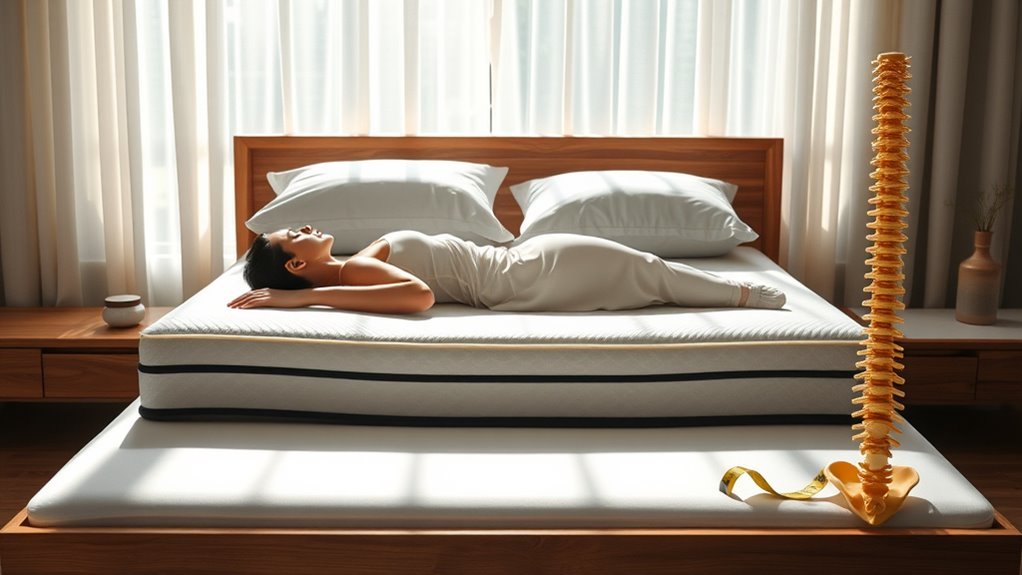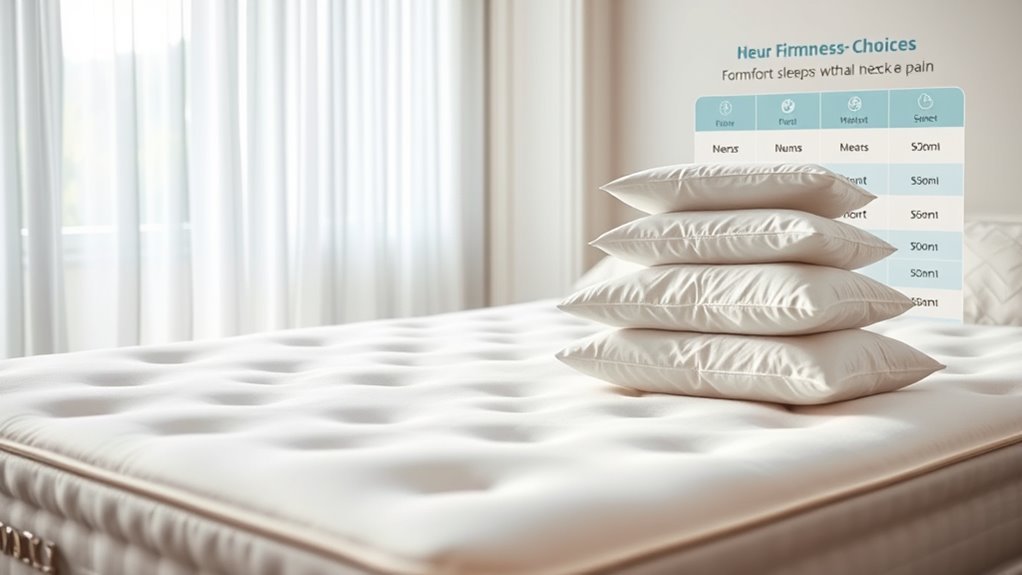When choosing a mattress as a stomach sleeper with neck pain, prioritize medium-firm options that guarantee proper spinal alignment. A thinner pillow may reduce neck strain, while materials like latex or hybrid designs provide responsive support. Look for mattresses with pressure relief features and good cooling properties to enhance comfort. Remember, testing different firmness levels is essential. If you’re curious about more specific tips and details, you’ll find helpful insights on what to take into account next.
Understanding the Unique Needs of Stomach Sleepers

When it comes to selecting a mattress, understanding the unique needs of stomach sleepers is essential, as their sleeping position can lead to specific comfort and support challenges. Since you’re likely to experience pressure on your neck and spine, finding a mattress that provides adequate support without being too soft is vital. You might prefer a medium-firm option that keeps your body aligned while allowing for some cushioning. This balance helps alleviate discomfort, promoting better sleep quality and pain relief. Additionally, consider materials like latex or hybrid designs, which can offer the right support. Ultimately, prioritizing your comfort will empower you to wake up refreshed, free from the aches that often come with poor sleep positions.
Importance of Spinal Alignment

When you sleep on your stomach, proper spinal alignment is essential for avoiding discomfort and long-term issues. Choosing the right mattress firmness and considering your pillow height are key factors in maintaining that alignment. Let’s explore how these elements work together to support your body while you sleep.
Proper Body Positioning
Proper body positioning is essential for stomach sleepers, as it directly impacts spinal alignment and overall comfort. When you’re lying face down, maintaining ideal alignment is vital to avoid neck pain. Your sleep posture plays a significant role in how well you rest.
Here’s a quick reference to keep in mind:
| Positioning | Benefits | Tips |
|---|---|---|
| Head Level | Reduces neck strain | Use a thin pillow |
| Hips Aligned | Maintains lumbar support | Keep hips in line with shoulders |
| Legs Straight | Avoids lower back tension | Try placing a pillow under your pelvis |
Mattress Firmness Levels
Finding the right mattress firmness is crucial for stomach sleepers, as it directly influences spinal alignment and overall comfort during sleep. If your mattress is too soft, your hips might sink, leading to misalignment and neck pain. Conversely, a mattress that’s too firm can create pressure points, causing discomfort. Look for a medium-firm mattress that balances support and comfort layers. This guarantees your spine stays in a neutral position while still providing the necessary cushioning. Pay attention to mattress construction; materials like memory foam or latex can offer the right combination of support and sinkage. When you prioritize the right firmness, you give yourself the freedom to enjoy restful nights and wake up rejuvenated, free from pain.
Pillow Height Consideration
Since maintaining spinal alignment is essential for stomach sleepers, the height of your pillow plays a significant role in your overall comfort. A pillow that’s too high can strain your neck, while one that’s too low may leave your spine misaligned. Opt for a thinner pillow, preferably made of supportive materials like memory foam or latex, which contour to your neck without elevating your head excessively. The pillow shape also matters; a flatter design can help maintain proper alignment. Consider adjustable options that let you customize the height to suit your needs. By selecting the right pillow height, material, and shape, you can enhance your sleep quality and reduce neck pain, ultimately granting you the freedom to enjoy restful nights.
Choosing the Right Firmness Level

When selecting a mattress for stomach sleeping, firmness level plays an essential role in ensuring a comfortable night’s rest. You’ll want to evaluate firmness testing to find the right balance for your needs and preferences. Here are three key factors to guide your choice:
- Support: A medium to medium-firm mattress often provides the right support, preventing your hips from sinking too deeply.
- Alignment: Look for a firmness that maintains proper spinal alignment, reducing neck pain.
- Sleeper Preferences: Everyone’s comfort levels differ, so test various firmness options to see what feels best for you.
Material Matters: Best Mattress Types for Stomach Sleepers
When it comes to choosing a mattress as a stomach sleeper, the material and firmness level are essential. You’ll want a supportive mattress that keeps your spine aligned while preventing sinking in too deeply. Let’s explore the best material options that can help you achieve a comfortable night’s sleep.
Optimal Firmness Level
Finding the right firmness level for a mattress is essential for stomach sleepers, as it can greatly impact your comfort and spinal alignment. A mattress that’s too soft can cause your hips to sink, leading to neck pain and poor sleep quality. Conversely, a mattress that’s too firm might not provide enough contouring. Here’s how to choose:
- Medium-Firm: Generally, a medium-firm mattress strikes the right balance, promoting proper spinal alignment while ensuring comfort.
- Durability: Look for materials that maintain their firmness over time, ensuring longevity and consistent support.
- Personal Preference: Ultimately, test various firmness levels to find what feels best for you, balancing comfort and support for better sleep quality.
Your choice can lead to freedom from pain and restful nights.
Supportive Material Choices
Choosing the right firmness level is just the beginning; the materials used in your mattress play a significant role in your overall comfort and support as a stomach sleeper. When it comes to material choices, you’ll find that both memory foam and latex options have unique benefits. Memory foam contours to your body, providing pressure relief, while latex offers responsive support and durability.
Here’s a quick comparison to help you decide:
| Material Type | Benefits |
|---|---|
| Memory Foam | Pressure relief, contouring |
| Latex | Bounce, breathability |
| Hybrid | Combines foam and coils |
| Innerspring | Firm support, classic feel |
| Gel-infused Foam | Cooling properties, support |
Choose wisely to guarantee you wake up refreshed and free from discomfort!
Pressure Relief Features to Look For
For stomach sleepers, pressure relief is essential to guarantee a comfortable night’s sleep and prevent discomfort. When choosing a mattress, pay attention to specific features that enhance pressure relief within the mattress construction. Here are three key items to look for:
- Foam Layers: High-quality memory foam or latex can contour to your body, providing targeted pressure relief while supporting your spine.
- Zoned Support: Mattresses with varying firmness levels can offer enhanced pressure relief, especially in areas like the hips and shoulders.
- Cooling Properties: Breathable materials help regulate temperature, ensuring you stay comfortable and avoid excessive pressure build-up during the night.
Evaluating Mattress Support and Responsiveness
While pressure relief is essential for stomach sleepers, equally important is the mattress’s support and responsiveness. You need supportive layers that keep your spine aligned while preventing sinking, which can exacerbate neck pain. Look for a mattress that balances firmness with comfort; it should provide enough resistance to support your body without causing discomfort.
Also, consider mattress durability—higher-quality materials often enhance the lifespan of the mattress and maintain its supportive structure over time. A mattress that wears out quickly won’t offer the consistent support you require. Evaluate how well the mattress responds to your movements; it should adapt without losing its supportive qualities. Ultimately, choosing the right mattress can greatly improve your sleep quality and overall well-being.
Trial Periods and Return Policies
When you’re investing in a mattress, understanding trial periods and return policies can make all the difference in ensuring you find the right fit for your stomach-sleeping needs. Here are three key points to evaluate:
- Trial Options: Look for brands that offer generous trial periods, typically ranging from 60 to 120 nights, allowing you to test the mattress thoroughly.
- Mattress Guarantees: Check the warranty and guarantee details; a solid guarantee can protect your investment and give you peace of mind.
- Return Policies: Familiarize yourself with the return process. Some companies may offer free returns, while others might charge fees.
Tips for Maintaining Your Mattress for Longevity
To guarantee your mattress lasts for years, it’s essential to adopt some simple maintenance habits. Start with regular mattress cleaning; vacuuming every month helps eliminate dust mites and allergens. Rotate your mattress every three to six months to promote even wear and extend its lifespan. Use a mattress protector to shield against spills and stains, which can greatly impact the longevity of your mattress. Make sure to keep your bedroom well-ventilated to reduce moisture buildup, which can lead to mold. Finally, avoid jumping on your bed or using it as a trampoline; this can damage the internal structure. By following these longevity tips, you’ll guarantee a comfortable and supportive sleep surface for years to come.
Frequently Asked Questions
Can Stomach Sleepers Use Pillows to Alleviate Neck Pain?
Yes, stomach sleepers can use pillows to alleviate neck pain, but it’s essential to choose the right pillow types. A thin, adjustable pillow can help maintain a neutral spine alignment, reducing strain on your neck. Avoid thick pillows that elevate your head too much, as they can worsen discomfort. Consider your sleep posture and how different pillow types affect your alignment, ensuring that you wake up feeling refreshed and pain-free.
How Often Should I Replace My Mattress?
Most experts agree that you should replace your mattress every 7 to 10 years, but it really depends on its lifespan and your comfort. If you start noticing sagging, lumps, or you’re waking up with aches, those are clear replacement signs. Remember, a good mattress can greatly improve your sleep quality, so don’t hesitate to invest in your rest. Prioritize your comfort—after all, a better night’s sleep leads to a better day!
What Are Signs That My Mattress Is Too Soft?
If your mattress is too soft, you’ll notice sagging, making it hard to maintain proper spine alignment. You might wake up with aches or feel like you’re sinking rather than sleeping on top. If you’re constantly tossing and turning to find comfort, it’s a clear sign your mattress firmness isn’t right for you. Trust your body; it knows when support is lacking, and finding the right mattress can bring you the restful sleep you deserve.
Are Adjustable Beds Beneficial for Stomach Sleepers?
Yes, adjustable beds can be highly beneficial for stomach sleepers. For instance, imagine a stomach sleeper who struggles with constant neck pain; by elevating their head slightly, they can find better alignment, reducing discomfort. The adjustable bed benefits include customizable positions that enhance stomach sleeper comfort, allowing you to find the perfect angle. This flexibility can help alleviate pressure points, providing a more restful night’s sleep while promoting overall spinal health.
Can Mattress Toppers Improve Comfort for Stomach Sleepers?
Yes, mattress toppers can definitely improve comfort for stomach sleepers. They add an extra layer of cushioning, helping with pressure relief while maintaining the necessary mattress firmness. This can alleviate discomfort, especially in sensitive areas like the neck and shoulders. If you’re looking for a way to enhance your sleep experience, a quality mattress topper can provide that additional support you need, allowing you to wake up feeling refreshed and pain-free.



